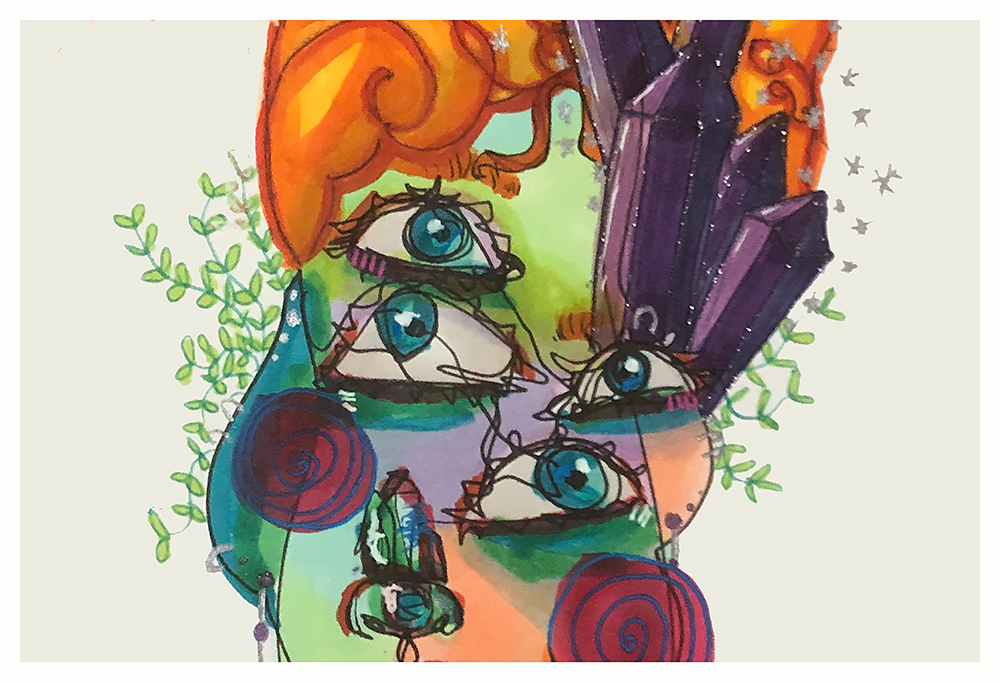Unconventional Readings in Undergraduate Philosophy Courses
Plato? Check. Descartes? Check. Hume? Check….
The typical introductory level undergraduate philosophy course will have a reading list of rather familiar historical and contemporary philosophers. That makes sense—they’re philosophy courses, after all, and the philosophers we’re familiar with are familiar to us because of the value so many people have found in their works.

[Zola Weinberg, untitled (detail)]
Brandon Boesch, assistant professor of philosophy at Morningside College, would like to hear about them. He sent in a question for the readers of Daily Nous:
What is an ‘unconventional’ reading that you enjoy teaching in undergraduate courses that others might want to be aware of?
Related: Philosophy Data from the Open Syllabus Project, A Flowchart of Philosophical Novels and Stories, Diversity Reading List for Philosophy, A Collection of Stories for Teaching Ethics



I love Larissa MacFarquhar’s essay “The Children of Strangers” (in the New Yorker and also in her book Strangers Drowning). It’s at least as good as any philosophical text at getting to the heart of questions about morality, demandingness, and parental obligation, and MacFarquhar writes beautifully.
This is really beautiful and thought-provoking–thank you! I think I’ll use this when we discuss parenthood in an intro to ethics class.
I’m sure that I stole this idea from somebody else, but I’m quite fond of Terry Bisson’s “They’re Made Out of Meat” for classes on dualism vs physicalism: https://www.mit.edu/people/dpolicar/writing/prose/text/thinkingMeat.html
I love this and have used it occasionally. When I do, rather than assign it, I like to read through it live in class, with me and a volunteer student acting it out. It’s fun.
Me too!
There’s a video of this that I ask my students to watch — https://youtu.be/7tScAyNaRdQ
‘Are you my mother?”, read on the same day as Plato’s Meno. Philosophy for Children folks have a number of children’s literature that pair nicely with ‘traditional’ philosophical text.
I use almost no “conventional” works, instead opting to center traditionally excluded or marginalized voices. Sometimes I just don’t use texts at all!
I sometimes had students in a sophomore-level Business Ethics course read Steinbeck’s The Winter of Our Discontent and watch Spike Lee’s “Do the Right Thing.”
I’ve used Alice Gregory’s New Yorker article “The Sorrow and Shame of the Accidental Killer” to teach moral luck a few times and it works pretty well I think. I’m using Akira Kurosawa’s “Rashomon” this semester to introduce the idea of testimony and the epistemic problems it raises. I can’t say yet how well it works since that units still a few weeks off, but I’m optimistic.
Let’s see if anyone cops to the *most* unconventional kind of reading: a secondary source!
Assign a secondary source? I frequently write them up for my students when I think the primary source is just too dense or poorly written for the level of class.
If we’re taking “reading” narrowly, then I like Eula and Mavis Biss’s article “Are Anti-Vaxxers Conscientious Objectors?” and Harriet McBryde Johnson’s NYT piece, “Unspeakable Conversations.”
If we are being a bit more broad – I’ve assigned the film Moonstruck when I want to talk about family, ritual, fear of death, and art’s role in the good life.
I often start Intro with the first chapter of Gareth Matthews’s “Philosophy and the Young Child.” It’s short and non-technical and no arguments are made; it simply showcases young kids starting to ponder some basic problems in epistemology and metaphysics. Since most Intro students don’t yet know what “philosophy” even is (does anyone…?), reading about these kids’ questions helps generate good discussion about metaphilosophy. It also has the advantage of reminding many of the students that they too can do philosophy, since many of them identify with the same questions the children are asking.
Coetzee’s The Lives of Animals as part of the introductory course on ethics.
I used to teach that in Intro to Ethics as well! It works great.
I used to teach Into Thin Air as a way of illustrating moral luck in Intro to Ethics class. They enjoyed it a lot more than Nagel.
I’ve used Ursula Le Guin’s “The Ones Who Walk Away from Omelas” as a critique of utilitarianism.
I’ve also used “Omelas” to interrogate “walking away” as a moral stance.
I have assigned “Nîso-okâwimâwak (Two Mothers)” in my intro to feminist theory class. It’s a wonderful autobiographical piece engaging with motherhood from a lesbian and Indigenous perspective. (Most) students loved it!
I have assigned – with some success – David Macaulay’s children’s book “Motel of the Mysteries” as a nice background for philosophy of science, especially feminist philosophy of science.
On animal minds and moral status, David Foster Wallace’s ‘Consider the lobster’ is a great classic.
I cannot recommend Drew Magary’s “The Night the Lights Went Out” highly enough. It’s an essay about his brush with death a couple years ago and I use it to talk with my students about death and its impact on the meaning of life. Students seem to really love it, and the piece is so well written. He’s apparently developing it into a full-length memoir.
https://theconcourse.deadspin.com/the-night-the-lights-went-out-1834298070
Octavia Butler’s short story “Bloodchild” (paired with excerpts from Virginia Held’s article “Birth and Death”).
I have used Graham Greene’s novel The Quiet American when teaching ideology. Lends itself to a very rich discussion of (among other things) what developed countries owe the developing world, intellectual virtues and vices, the nature of guilt/blame/responsibility, arguments for and against using political violence, debating political neutrality vs political involvement, the factors that influence the development of our ideological beliefs, and how we should deal with people who are ideologically and culturally very different from ourselves.
I have another Larissa MacFarquhar recommendation.I’ve used “The Comforting Fictions of Dementia Care,” also from the New Yorker, in Medical Ethics.